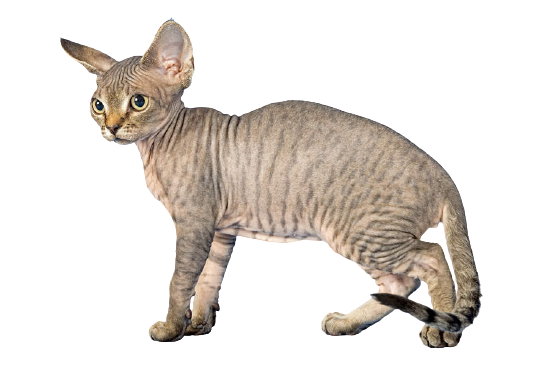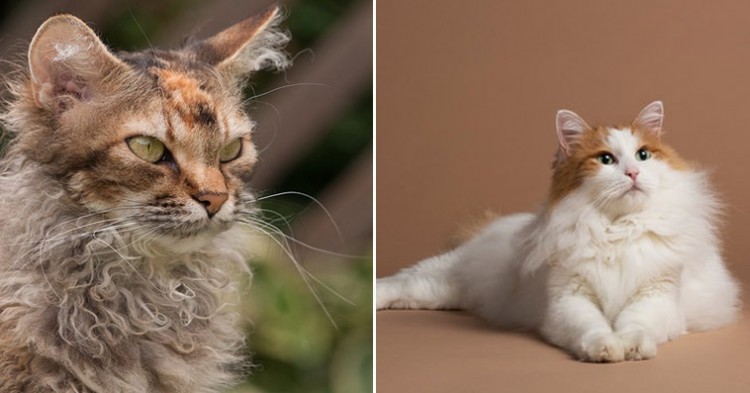
Devon Rex
USD $1200 - $1800 Price Avg.
Smallest, Small
Size
Yes
Lap Cat
10 to 15 years
Lifespan
Breed Information
| Popularity/Rank | 7 |
|---|---|
| Name | Devon Rex |
| Other names | Pixie cat, Alien cat, Poodle cat |
| Origin | United Kingdom |
| Size | Smallest, Small |
| Coat | Curly, Silky, Soft, Short |
| Lap Cat | Yes |
| Lifespan | 10 to 15 years |
| Temperament |
Loyal, Mischievous, Playful, Social, Highly interactive Devon Rex Temperament Devon Rex Temperament: Loyal The Devon Rex is a loyal and loving cat, often forming strong bonds with their owners. They are known for their mischievous nature and playfulness, and love to be around people. They are also highly interactive, making them great companions. |
| Weight | Female: 5 - 8 pounds, Male: 8 - 10 pounds |
| Colors | Black, Blue, Chocolate, Cream, Fawn, Lavender, Red, White |
| Kitten Prices |
USD $1200 - $1800
A Devon Rex kitten can cost anywhere from USD $1200 to $1800. The price of a Devon Rex kitten depends on the breeder, the reputation of the breeder, and the quality of the kitten. The price of a Devon Rex kitten also depends on the parents of the kitten. If the parents are from a reputable breeder, then the kitten will likely be more expensive. If the parents are from a less reputable breeder, then the kitten will likely be less expensive. The quality of a Devon Rex kitten also affects its price. A higher quality kitten will be more expensive than a lower quality kitten. So, is it good to choose a Devon Rex cat? That depends on your budget and what you're looking for in a cat. If you have a limited budget, then you may want to consider another breed of cat. But if you're looking for a high-quality, affectionate cat, then a Devon Rex may be right for you. |
Breed Characteristics
| Adaptability | |
|---|---|
| Affection Level | |
| Child Friendly | |
| Dog Friendly | |
| Energy Level | |
| Grooming | |
| Health Issues |
Heart defects, kidney disease, deafness Is Devon Rex cat Hypoallergenic? There is no definitive answer to this question as each individual reacts differently to different animals. However, Devon Rex cats are considered to be hypoallergenic as they produce less of the protein that is responsible for triggering allergies in people. This makes them a good choice for people who are looking for a hypoallergenic pet. 1. Heart Defects The Devon Rex is a breed of cat that is known to be prone to heart defects. These defects can range from mild to severe, and in some cases can even be life-threatening. The most common type of heart defect seen in Devon Rex cats is a condition called pulmonic stenosis, which is a narrowing of the pulmonary valve. This condition can cause the heart to work harder and can eventually lead to heart failure. Other less common heart defects that have been seen in Devon Rex cats include septal defects, patent ductus arteriosus, and cardiomyopathy. 2. Kidney Disease Kidney disease is another health issue that is commonly seen in Devon Rex cats. The kidneys are responsible for filtering the blood and removing waste products from the body. When the kidneys are not functioning properly, these waste products can build up in the blood and cause a variety of health problems. Symptoms of kidney disease can include weight loss, increased thirst, increased urination, and lethargy. If left untreated, kidney disease can be fatal. 3. Deafness Deafness is another health issue that is seen in some Devon Rex cats. Deafness can be either congenital (present at birth) or acquired. Congenital deafness is usually caused by a genetic defect, while acquired deafness can be caused by a variety of factors, including infection, trauma, or exposure to loud noise. Deafness can be partial or complete, and it can affect one or both ears. Cats with deafness may have difficulty hearing sounds, and they may also have difficulty communicating with other cats. |
| Intelligence | |
| Shedding | |
| Social Needs | |
| Stranger Friendly | |
| Vocalization | |
| Health Care |
Devon Rex cats are a relatively healthy breed, but like all cats, they are susceptible to certain health problems. Some of the most common health problems seen in Devon Rex cats include respiratory problems, heart disease, and kidney disease.
Devon Rex cats are also prone to certain genetic health problems, such as genetic deafness and genetic eye problems. Therefore, it is important to have your Devon Rex cat checked by a veterinarian on a regular basis and to keep up with their vaccinations. There are some things you can do at home to help keep your Devon Rex cat healthy. For example, feeding them a high-quality diet, providing them with plenty of fresh water, and keeping their litter box clean. Additionally, regular exercise and playtime are important for keeping your Devon Rex cat healthy and happy. |
History
The Devon Rex is a breed of domestic cat that emerged in England during the 1960s. The Devon Rex is characterized by its short, curly coat and large ears. The Devon Rex is a relatively new breed, and its exact origins are unknown. However, the Devon Rex is believed to be descended from the Cornish Rex, which was developed in Cornwall, England during the 1950s.
The Devon Rex nearly became extinct in the 1970s due to a genetic defect that caused many of the kittens to be born with deformities. However, a few healthy Devon Rex cats were found and used to restart the breeding program. The Devon Rex eventually became popular in Europe and North America.
The ancestry of the Devon Rex is largely unknown due to the fact that it is a relatively new breed. However, it is believed that the Devon Rex descends from the Cornish Rex, which was developed in Cornwall, England during the 1950s. The Cornish Rex is itself a descendant of the Siamese cat. Thus, the Devon Rex likely has Siamese ancestry as well.
The Devon Rex was recognized as a distinct breed by The International Cat Association (TICA) in 1979.
Description
The Devon Rex is a unique looking cat that is sure to turn heads. With its large ears, short legs, and wavy coat, the Devon Rex is a one-of-a-kind feline. While they may look fragile, Devon Rexes are actually quite hardy cats. They are also known for being very friendly and loving, making them great pets for families with children or other pets. Here is everything you need to know about the Devon Rex.
Appearance:
The Devon Rex has a very distinctive appearance. They have large ears that sit high on their head, giving them an alert and inquisitive look. Their eyes are large and expressive, and their bodies are long and slender. Devon Rexes come in a variety of colors, including black, blue, brown, cream, red, white, and silver. They also have a variety of coat patterns, including bi-color (two colors), tri-color (three colors), pointed (one color with darker extremities), and tabby (striped).
Size:
Devon Rexes are medium sized cats. They weigh between 8 and 12 pounds on average. Males tend to be larger than females. Devon Rexes have short legs in proportion to their bodies. This gives them a slightly hunched appearance when they walk or run.
Lifespan:
The average lifespan of a Devon Rex is 10-12 years. However, some Devon Rexes have been known to live into their early 20s with proper care!
Personality:
Devon Rexes are known for being very friendly and loving cats. They love to be around people and other animals, and they do not do well when left alone for long periods of time. Devon Rexes are also very playful cats – they love to play games such as fetch or chase after toys. Because of their friendly nature, Devon Rexes make great family pets. They do well with children and other pets in the home. However, because they love attention so much, they may become jealous if they feel like they are not getting enough attention from their owners!





